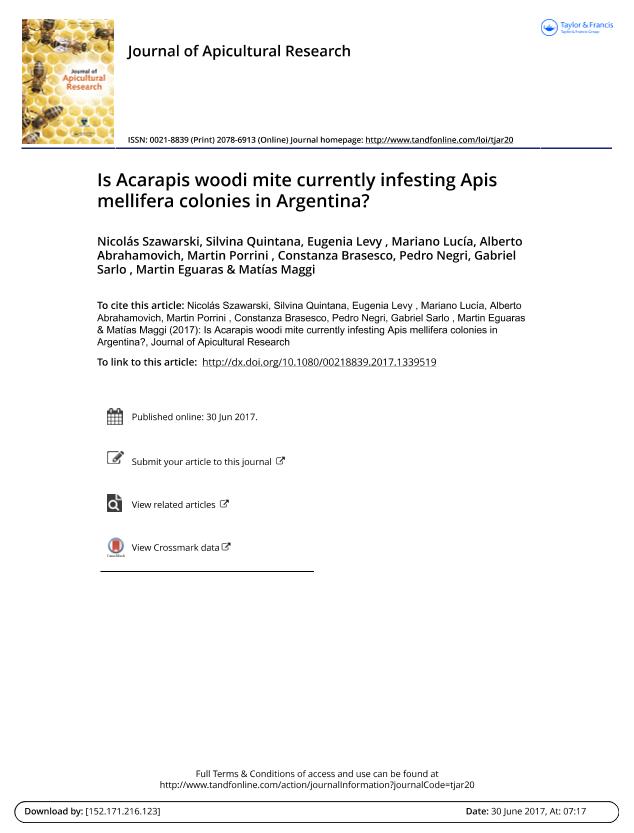Artículo
Is Acarapis woodi mite currently infesting Apis mellifera colonies in Argentina?
Título:
¿Está actualmente Acarapis woodi infestando colonias de Apis mellifera en Argentina?
Szawarski, Nicolás ; Quintana, Silvina
; Quintana, Silvina ; Levy, Eugenia; Lucia, Mariano
; Levy, Eugenia; Lucia, Mariano ; Abrahamovich, Alberto Horacio
; Abrahamovich, Alberto Horacio ; Porrini, Martín Pablo
; Porrini, Martín Pablo ; Brasesco, Maria Constanza
; Brasesco, Maria Constanza ; Negri, Pedro
; Negri, Pedro ; Sarlo, Gabriel; Eguaras, Martin Javier
; Sarlo, Gabriel; Eguaras, Martin Javier ; Maggi, Matías Daniel
; Maggi, Matías Daniel
 ; Quintana, Silvina
; Quintana, Silvina ; Levy, Eugenia; Lucia, Mariano
; Levy, Eugenia; Lucia, Mariano ; Abrahamovich, Alberto Horacio
; Abrahamovich, Alberto Horacio ; Porrini, Martín Pablo
; Porrini, Martín Pablo ; Brasesco, Maria Constanza
; Brasesco, Maria Constanza ; Negri, Pedro
; Negri, Pedro ; Sarlo, Gabriel; Eguaras, Martin Javier
; Sarlo, Gabriel; Eguaras, Martin Javier ; Maggi, Matías Daniel
; Maggi, Matías Daniel
Fecha de publicación:
08/2017
Editorial:
International Bee Research Association
Revista:
Journal Of Apicultural Research
ISSN:
0021-8839
Idioma:
Inglés
Tipo de recurso:
Artículo publicado
Clasificación temática:
Resumen
The honey bee tracheal mite Acarapis woodi (Rennie) (Acari: Tarsonemidae) is an internal obligate parasite of the respiratory system of adult honey bees (Apis mellifera), which may be one of the factors causing the loss of bee colonies and the decrease in the beekeeping industry. In Argentina, the last prevalence study of A. woodi was in 1998, and therefore there is no current data on the prevalence and impact of the mite in colonies of A. mellifera in this country. For this reason, the objective of this study was to determine the prevalence of A. woodi in honey bee colonies of apiaries belonging to different geographic regions of Argentina (Northwest, Chaco, Mesopotamic, Pampean and Patagonic) using two different methods of diagnosis. One method was traditional microscopy, which is based on direct visualization of A. woodi in the prothoracic tracheas of bees, and the other technique was molecular analysis using real-time PCR with specific primers to amplify CO1 gene of A. woodi. To perform the analysis of prevalence, bees were collected during winter, because during this season, populations of A. woodi are more abundant in bee colonies. The results were negative for both methods of diagnosis, with prevalence equal to 0%. Considering that in recent years it has been reported an increased mortality in bee colonies in Argentina, we note that acarapisosis is not currently impacting on the disappearance of A. mellifera colonies in Argentina.
Archivos asociados
Licencia
Identificadores
Colecciones
Articulos(CCT - LA PLATA)
Articulos de CTRO.CIENTIFICO TECNOL.CONICET - LA PLATA
Articulos de CTRO.CIENTIFICO TECNOL.CONICET - LA PLATA
Articulos(CCT - MAR DEL PLATA)
Articulos de CTRO.CIENTIFICO TECNOL.CONICET - MAR DEL PLATA
Articulos de CTRO.CIENTIFICO TECNOL.CONICET - MAR DEL PLATA
Citación
Szawarski, Nicolás; Quintana, Silvina; Levy, Eugenia; Lucia, Mariano; Abrahamovich, Alberto Horacio; et al.; Is Acarapis woodi mite currently infesting Apis mellifera colonies in Argentina? ; International Bee Research Association; Journal Of Apicultural Research; 56; 4; 8-2017; 387-393
Compartir
Altmétricas



